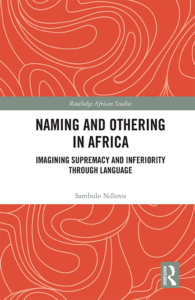2020
 Visiting scholar (funded by the Alexander von Humboldt Foundation)
Visiting scholar (funded by the Alexander von Humboldt Foundation)
May 2020 – April 2022
Dr. Sambulo Ndlovu
Great Zimbabwe University, Zimbabwe
Sambulo Ndlovu is a Senior Lecturer in the Department of African Languages and Culture at the Great Zimbabwe University. He received his PhD in Linguistics from the University of Cape Town, focusing on the sociolinguistics of youth language along the age, sex, urbanity and class variables, using S'ncamtho the Zimbabwean Ndebele-based youth variety as a case study. He is an Alexander von Humboldt postdoctoral research fellow from 1st May 2020 to 30th April 2022 at the Institut fur Ethnologie und Afrikanstudien and is hosted by Jun.-Prof. Dr. Nico Nassenstein. His research project is titled; “Formation patterns, social impact and pragmatics of address terms and hypocorisms in African urban youth languages: The case of S'ncamtho in Bulawayo”. The study focuses on lexicalisation and usage of lexis in youth varieties it is a combination of onomastics and pragmatics in youth language analysis. He seeks to locate youth varieties at the point of interlocution with other age groups and in contexts outside the urban youth culture. The interlocutions are bound to affect both youth and standard languages as different situations may require accommodation and compromise. The study aims at characterising address terms and hypocorism in S'ncamtho and applying a linguistic analysis to determine the derivational formation patterns, after the linguistic analysis, the study seeks to test the influence of S'ncamtho address terms and hypocorisms along the dimensions of age, sex and setting from the points of knowledge and pragmatic usage. The pragmatics of usage is evaluated within kinship, friendship, formal and work environments. The research is framed on the theories of Social Impact and Social Practice whereby S'ncamtho address terms and hypocorisms are analysed and evaluated along the dimensions of spread and pragmatic use.
Email: sandlovu@uni-mainz.de
 Publications and Talks 2021/2022
Publications and Talks 2021/2022
Books
Ndlovu, S. (2021). Naming and Othering in Africa: Imagining Supremacy and Inferiority through Language. Routledge. ISBN: 978-0-367-77310-6.
Book chapters
Ndlovu, S. (2021). 14 Semanticising the ‘new’ in the New Dispensation. The Zimbabwean Crisis after Mugabe: Multidisciplinary Perspectives, 241.
Ndlovu, S. (2021). Mutation of Lobola and “Othering” of Women in Ndebele Culture. In Lobola (Bridewealth) in Contemporary Southern Africa (pp. 185-200). Palgrave Macmillan, Cham.
Articles
Ndlovu, S., Sibanda, K., & Motsholapheko, M. (2022). Hydronyms of pools along Gweru River in the silobela district of Zimbabwe as holistic indigenous knowledge (IK) for integrated water resources management. Physics and Chemistry of the Earth, Parts A/B/C, 125, 103104.
Ndlovu, S. (2021). Decolonisation of the Zimbabwean linguistic landscape through renaming: a quantitative and linguistic landscaping analysis. African Identities, 1-17.
Ndlovu, S. (2021). Coloniality of power and resistance in some interracial toponomastic transphonologies in Zimbabwe. Marang: Journal of Language and Literature, 34.
Talks
Ndlovu, S (2021). The ethnopragmatics of gender in Ndebele deverbative forenames. Names Society of Southern Africa Conference. Durban University of Technology- Durban South Africa, 04 November, 2021
Ndlovu, S (2021) Gender intimations in the morphology of some Ndebele personal names. Great Zimbabwe University and JGU research symposium GZU Masvingo Zimbabwe 26 November 2021.
Ndlovu, S. (2021). Information and communication technologies as source domains in S'ncamtho metaphor conceptualisation. 10th World Congress of African Linguistics (WOCAL), Leiden University June 7-12 2021.
Ndlovu, S. (2021). Nomen enumeration and grading of global states as perpetuation of imperial hierarchies. International Association of Colonial and Post-colonial Linguistics (IACPL) conference University of the Western Cape 28-30 June 2021.
Ndlovu, S. Partial homophony and predictability in lexicalising S'ncamtho and Ndebele slang- Institute of anthropology and African studies- JGU; May 11, 2021.
 Publications and Talks 2021/2022
Publications and Talks 2021/2022